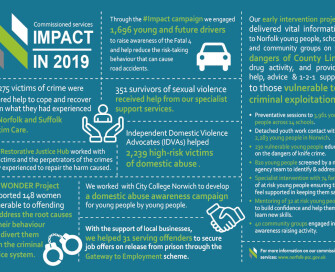Making a difference - our commissioned services in 2019
From supporting victims of crime and safeguarding the vulnerable, to rehabilitating those who commit crime and making communities safer, find out how our commissioned services made a difference last year.
If you were asked what a Police and Crime Commissioner (PCC) does, even with no prior knowledge or understanding, the title would probably give you a fairly good clue. But the role extends far beyond the governance of policing and the setting of plans and priorities for tackling crime in their police force area.
The ‘commissioner’ element of the job is fundamental to how a PCC works to improve community safety, make criminal justice and offender rehabilitation more effective, support victims and witnesses of crime, and protect from harm the most vulnerable in our communities.
Using a dedicated budget (£2 million in Norfolk in 2019), separate from that which is used to fund policing in the county, your PCC is responsible for securing services and designing and delivering projects which tackle the key issues highlighted within their Police and Crime Plan.
In Norfolk, PCC Lorne Green is supported in doing this by a small team of experts on subjects such as crime prevention, victim support, safeguarding and offender rehabilitation. Guided by research and best practice, that team works with partners from across Norfolk to identify innovative solutions to the issues affecting the county’s communities while making best use of the specialist knowledge, experience and skills offered by local charities and voluntary sector organisations.
During 2019, those projects and services provided emotional and practical support to thousands of victims of crime.
They helped protect those at risk of abuse and exploitation, and raise awareness of domestic violence and the impact of County Lines drug activity.
They helped educate young and future drivers on the dangers of the road and potential impact on them and their families of not taking seriously the responsibility that comes with a driving license.
People vulnerable to committing crime received help to identify and address the causes of their offending behaviour, and make positive changes to turn their lives around.
This is how those services have made a difference to those who have benefited from them:
- “What was good was that I was able to choose what I wanted to speak about. Slowly, I felt I could open up more and more. It helped having an impartial person to talk to. I’m close to my family but when I talked to them I could see it was hurting them. Dealing with things on your own – no matter how strong you think you are – is hard. Having someone to talk to helped me get back to being me.” (Norfolk and Suffolk Victim Care)
- “What I had experienced was ‘normal’ for me – it was all I knew. I’m only now beginning to think ‘that’s not right’, to think in a different way and know it’s not my fault, that I deserve respect and I can put up boundaries. Coming here, it’s regular, you get to see the same person, to talk without being pushed or judged. It’s so peaceful, and the caring comes out of the walls. It’s the people who make the difference. I’m a much stronger person than when I first came here.” (Support service for survivors of sexual abuse)
- “I’m feeling more and more confident. I can’t believe the difference it has made to all my family. You have helped me so much. I would not have had a clue what to do. You gave me a lot of strength and I really felt I had support. I haven’t truly had that before and I can’t thank you enough. It’s life-changing.” (Independent Domestic Violence Advocates (IDVAs))
- “As a college, we have a responsibility to our students and community to raise awareness and understanding of many issues, including road safety. Young drivers form one of the main risk groups in road-related incidents where people are killed or seriously injured, so it’s important our young people are aware of the dangers. This is a great opportunity for our students to interact with the emergency services, gain a unique insight into the really important work they do and see first-hand the consequences of being reckless behind the wheel.” (#Impact young driver safety campaign)
- “The way he told us stories was interesting and engaging and I now know things that will help me stay away from gangs and avoid drug dealers.” (SOS+ Project - prevention of child criminal exploitation)
- “My head is in a lot better place. I’ve got goals now, I’ve got a purpose.” (Pathways Out Programme - prevention of child criminal exploitation)
- “For one student, the impact was seen immediately in the way he reacted to those around him making poor choices… I really think this could be pivotal in him staying in school.”
- (Pathways Out Programme - prevention of child criminal exploitation)
- “From day one, my link worker has been my rock. She always listened and never judged me. Before I met her, I was a mess and giving up on life. Now, because of everything she has done for me, I have become the best person I can be and I can’t thank her enough.” (Women Offenders of Norfolk Diversion, Engagement and Rehabilitation (WONDER))
- “Every day I learn something new and I am so grateful for this opportunity. In five years, I want to have made real progress and I want to have also helped people like me. If I can change the attitude of one person then that will be a success.” (Gateway to Employment)

Published
